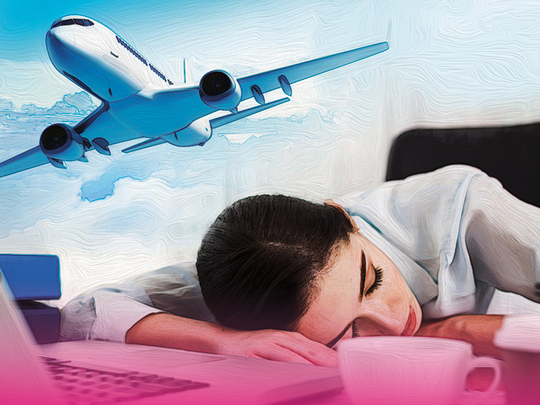
Summer travel is just around the corner, with schools over and Ramadan nearing its end, and family vacations soon to take people to faraway places. However, before we can enjoy those days of rest, discovery and fun, we need to worry about jet lag — at least if we’re going to travel across several time zones.
A few months ago, my brother had a short business trip to New York, and his wife decided to accompany him. She wanted to enjoy her first visit to the Big Apple by spending all her time sightseeing and shopping, while her husband was busy in meetings, but she later reported that jet lag had robbed her of half of her days.
What is ‘jet lag’? It is the fact that the biological clock in our body is disrupted when the conditions around us (light and temperature) and our activities (work or social) clash with what our body is expecting. For example, if your flight from Dubai to New York departs at 10am (UAE time) and arrives at 3pm (local time in New York), your body believes it’s 11pm and starts to fall asleep. Then it wakes you up seven or eight hours later ... when it’s 1am in New York! And it’s worse still if you travel east, as people’s experience and research have shown.
There have been many scientific studies of jet lag in recent years, as travel, for business or leisure, has increased manifold. In fact, the phrase ‘jet lag’ only appeared in the 1960s when jet planes started to fly thousands of people every day over long distances, crossing multiple time zones and “leaving our body rhythms behind”. The effects of jet lag were soon found to be huge, in terms of both the loss in productivity that they entailed and the impacts they had on people’s health. And in the last few years, technology too began to address the problem, as I shall mention below.
We now know why jet lag afflicts us. Our bodies are regulated by clocks that regulate various functions (from temperature and blood pressure to sleep and mental processes), all coordinated by a “master clock” located in the middle of our brains. These clocks are sensitive to a few important factors, most notably the amounts of light we receive and the level of melatonin that is in our blood at any moment. Melatonin is produced by the master clock and sent to the peripheral clocks to slow things down, lower the temperature, and so forth.
We also know why travelling east affects us more than travelling west: The clocks in our cells have rhythms that are a bit longer than 24 hours — not enough to trouble us in normal settings, but enough to make a difference when we’re dealing with longer days (travelling west) compared to shorter days (travelling east) thus travelling east becomes harder. And though things vary significantly from one person to another, studies have shown that adjusting to the new time zone takes on an average a number of days equal to half the number of time zones that we crossed, if we’ve gone west; and about two thirds if we’ve travelled east. For example, it normally takes four days to adjust when going from Dubai to New York (eight-hour difference) and about 6 days when travelling back to Dubai.
Exercise and nutrition
But don’t despair and start changing your vacation plans; there’s help, or at least some advice. The simplest advice is to try to adopt the rhythm of your destination as soon as you arrive. Resist your body’s call for sleep; follow your watch (with the new time). More sophisticated solutions involve subjecting yourself to strong doses of light during the mornings preceding your trip, that will shift your body’s rhythm by about two hours, thus lessening the effect of jet lag upon arrival. Taking small doses of melatonin — where available and with consultation with your doctor — has been found to help. And specific changes in exercise and nutrition patterns have been shown to have some positive impact.
There’s an app for that, as they say: All these tricks have now been combined in smartphone applications! I have not yet used any of the many apps that are available today, so I can’t recommend any specific one, but there are reviews that you can consult online, some from medical websites, and they give you, hour by hour, what you need to do, eat, exercise, sleep, take coffee, and whatnot. I have a trip to Mexico in a week’s time, and I plan to test one or two of these apps.
Some airlines have also started to help travellers on long, time-zone crossing trips. Some aeroplanes are now set to stronger lighting and slightly lower oxygen levels and to offer meals that are adapted to the body clocks’ needs (more or less proteins and carbohydrates, depending on whether one is flying east or west).
Medical research is making progress on the problem, and we are promised some drugs that will greatly help within a decade or so. So far, I have relied on my favourite drug, caffeine, to keep me awake in meetings or conferences, and on my favourite tech tool, my laptop, when I wake up in the middle of the night in my hotel room.
Whatever its effect, we must not let jet lag depress us and ruin our trips, whether for business or leisure. Try to minimise the effect of jet lag, but do enjoy your trip.
Nidhal Guessoum is a professor of physics and astronomy at the American University of Sharjah. You can follow him on Twitter at @NidhalGuessoum.












